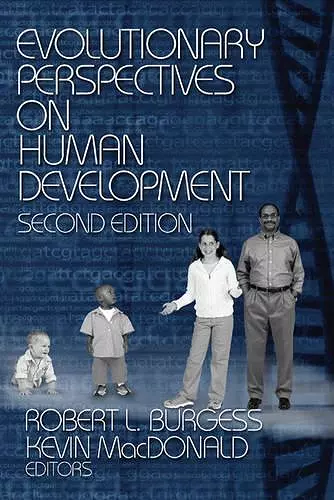Evolutionary Perspectives on Human Development
Kevin Macdonald editor Robert Lee Burgess editor
Format:Paperback
Publisher:SAGE Publications Inc
Published:31st Aug '04
Currently unavailable, and unfortunately no date known when it will be back

"This new edition of Evolutionary Perspectives on Human Development is obligatory reading for anyone interested in the integration of evolutionary theory into developmental psychology. . . . It provides a valuable corrective to recent narrow approaches which argue that the human mind is constructed exclusively of domain-specific mechanisms and which deemphasize the importance of human psychological and behavioral plasticity. . . . Anyone who reads this book will come away with a richer understanding of our shared human nature."
-Bill Irons, Northwestern University
"In this volume, Burgess and MacDonald have brought together a distinguished group of psychologists and anthropologists to investigate how-given our evolutionary heritage, genetic make-up and salient environment-behavior, cognition, and emotion unfold from the human organism. They make clear that both evolutionary functional and proximate behavioral perspectives are essential to understanding the human mind and its products. Many of these essays should be required reading for sociobiologists, evolutionary psychologists, and evolutionary anthropologists and their ilk."
-Jeffrey Kurland, Penn State
"It′s clear that evolutionary biology has a tremendous amount to offer when it comes to our understanding of human development, and yet, many experts in developmental psychology have remained impervious to these insights. At last, this may change: Burgess and MacDonald have compiled a rich array of theory and data, much of it contributed by the leading lights of evolutionary psychology (or, if you prefer, sociobiology). A very valuable collection and one that might help define a new and important field."
-David P. Barash, University of Washington
Evolutionary Perspectives on Human Development, Second Edition considers the role of evolutionary theory in the field of developmental psychology to examine key topics of individual human development. This unique book fills an important gap in the literature, applying evolutionary models to human development by focusing on central development issues. The book emphasizes both domain-general evolved psychological mechanisms and domain-specific processes. The text also integrates behavior-genetic research with evolutionary and developmental principles.
In this contributed volume, editors Robert L. Burgess and Kevin MacDonald have brought together a distinguished group of social and behavioral scientists employing multiple levels of analysis drawn from a variety of academic disciplines. This diverse group of contributors illustrates the enormous power of evolutionary theory by elucidating human behavior and its development...
"In this volume, Burgess and MacDonald have brought together a distinguished group of psychologists and anthropologists to investigate how-given our evolutionary heritage, genetic make-up and salient environment-behavior, cognition, and emotion unfold from the human organism. They make clear that both evolutionary functional and proximate behavioral perspectives are essential to understanding the human mind and its products. Many of these essays should be required reading for sociobiologists, evolutionary psychologists, and evolutionary anthropologists and their ilk."
-- Jeffrey Kurland"It′s clear that evolutionary biology has a tremendous amount to offer when it comes to our understanding of human development, and yet, many experts in developmental psychology have remained impervious to these insights. At last, this may change: Burgess and MacDonald have compiled a rich array of theory and data, much of it contributed by the leading lights of evolutionary psychology (or, if you prefer, sociobiology). A very valuable collection and one that might help define a new and important field."
-- David P. Barash"This new edition of Evolutionary Perspectives on Human Development is obligatory reading for anyone interested in the integration of evolutionary theory into developmental psychology. Its basic approach is not to reject and replace the earlier pre-evolutionary work of developmental and other psychologists but to combine the fruits of earlier work with the new insights from our rapidly growing understanding of how evolution has shaped all life forms especially human beings. It provides a valuable corrective to recent narrow approaches which argue that the human mind is constructed exclusively of domain-specific mechanism and which deemphasize the importance of human psychological and behavioral plasticity. The book presents a view of the human mind as consisting of both domain-specific and domain-general mechanisms and points to the importance of plasticity and intelligence in the unique way in which the brainiest of large-brained animals has adapted to its environment. The topics covered are broad ranging, including, among others, child and adolescent development, the development of cognition, language, morality, personality, emotional development, resource acquisition during ontogeny, and the role of kinship in shaping cooperation and competition. As it must, it also explores the dark-side of human development: the development of psychopathology and the maltreatment of children. Anyone who reads this book will come away with a richer understanding of our shared human nature."
-- Bill Irons"I feel that evolutionary psychology is a growing force, and it will come to dominate thinking in psychology. . . such a book now is timely."
-- Jon H. Kaas"The contributors are, as a group, a most impressive lot. . . . On the whole, there appears to be enough new material in the proposed book to cause an evolutionary developmental psychologist to adopt it as a supplementary book of readings. Too, I suspect that individuals such as myself, who are not developmental psychologists, would be inclined to buy it and read it."
-- E.J. CapaldiISBN: 9780761927907
Dimensions: unknown
Weight: 620g
464 pages
2nd Revised edition